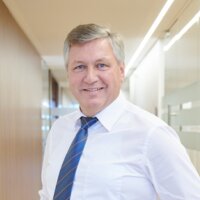

Gilbert and Richard Frizberg, managing directors and shareholders of F-Energies in the fourth and fifth generation, answered questions from Kleine Zeitung. They spoke about pressure for change, excessive bureaucracy, and the courage required as successors in a family business.
How does an energy and service company deal with a present characterized by a lot of instability, changes, and unpredictability?
RICHARD FRIZBERG: One advantage of our group of companies is that we operate in a sector that will certainly be in high demand in the coming years and decades because we provide services that play an important role in the current transformation. On one hand, in Austria with Hereschwerke, which offers industrial electrical and building electrical engineering services and increasingly focus on expanding PV systems. On the other hand, globally with Global Hydro Energy, which supplies electromechanical equipment for hydroelectric power plants.
Has the speed of pressure for change increased in the 135 years of company history?
GILBERT FRIZBERG: Yes.
RICHARD FRIZBERG: And it will become even faster. We feel this in internal processes and in business with customers. In this regard, the agility of a medium-sized company is an advantage in remaining competitive.
What hurdles do you encounter?
GILBERT FRIZBERG: With our services and products, we are part of, implementers, and accelerators of the energy transition. This means we also deal with local sensitivities. These must be considered on one hand – it's a matter of absolute fairness. But decisions must then also be made. And that's the overarching issue we face: that decisions take too long due to numerous repetitions and other hurdles in procedures and approvals…
RICHARD FRIZBERG: … and that there is also a lack of predictability whether decisions once made will actually hold. However, this predictability is urgently needed.
GILBERT FRIZBERG: Anything else not only paralyzes the republic but half of Europe, and it jeopardizes the energy transition. We have a kind of lived inconsistency there: something is advocated, but when it comes to implementation, initial resistance arises, and decision-making and perseverance fears dominate, making it difficult. We hinder ourselves there.
RICHARD FRIZBERG: With the envisaged energy transition, we are not fully tapping into our potential. Local and ideological obstacles often hinder the development of sustainable practices that are crucial for the common good.
Austria is said to have a talent for "gold plating" – exceeding international minimum standards, which subsequently hampers competitiveness. Is that true?
GILBERT FRIZBERG: Austria is very precise in this regard. If one out of 6000 products in a tender does not fit, that suffices as a formal reason for cancellation. These are points where we are overly bureaucratic. One sees less the content of what the regulation is for than the paragraph, the subordinate clause, the comma. These misdevelopments exist.
How much courage is needed to take on the leadership role in a family business given these conditions?
RICHARD FRIZBERG: I grew up with the company, but I have the advantage that pressure was never built up. I never felt pushed into it. Instead, I was able to gain experience abroad, and here we have jointly built professional structures and processes as an industry-related service provider, through which we are well-equipped thanks to our innovative power and function independently of who is at the helm in the family.
How heavy is the burden of the tradition of five generations of company history that one inherits?
RICHARD FRIZBERG: Thinking is certainly more long-term than if one were only in a management position in another company for a certain period of time. We have certain values and think in terms of generations, but we cannot rigidly cling to something because everything renews much faster.
Did it require more courage back then when you took over?
GILBERT FRIZBERG: The question didn't arise for me. I jumped into the deep end and had only "escort." It's completely different today. There are qualified colleagues and structures where you work in teams. My son has grown up much more in this team thinking. This results in a difference in style and methods. And that's a good thing.
Is there enough courage for change in society?
RICHARD FRIZBERG: We would already wish for a bit more courage. For us as a company, it's a prerequisite, but we also need employees who have a permanent willingness to change. In return, we offer an environment where you can actively contribute, change, develop, and shape something.